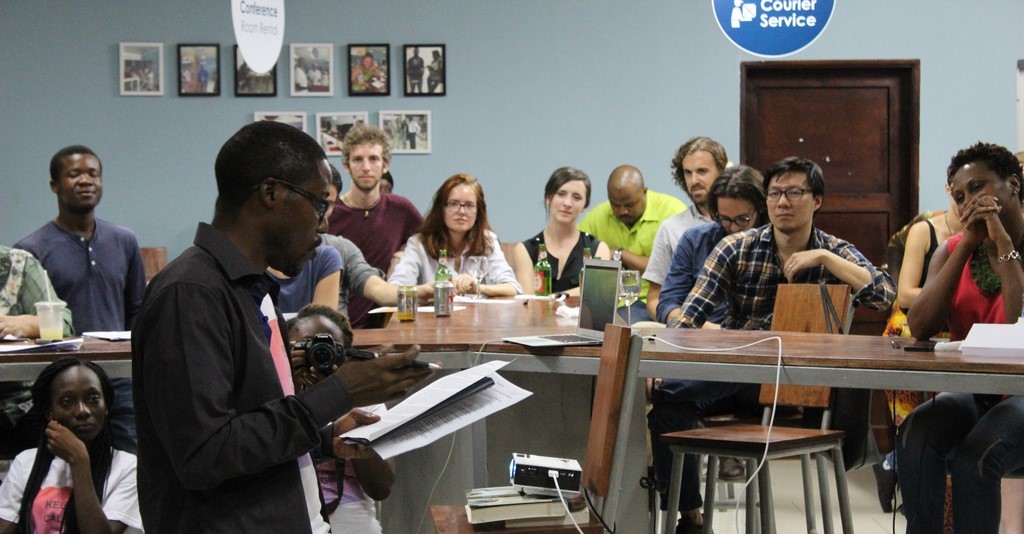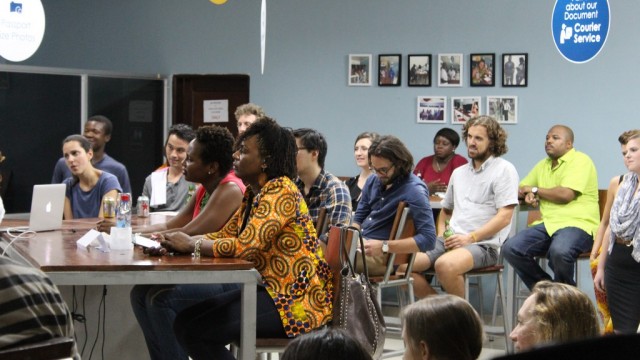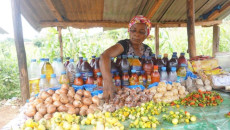MONROVIA, Montserrado – “We have to stop telling women what to do with their pussy,†a youthful man shouted aloud in Peace Café one Friday evening. “It’s your pussy!â€
Bursts of uncomfortable laughter ran through the small crowd at Sinkor’s trendy café. The young man was the Daily Observer’s Bai Best, reading a monologue from the fifth annual showing of the Vagina Monologues play in Liberia.
Best, the only male actor in the play would go on to dish out advice such as “I certainly recommend eating pussy.â€
The stated goal of the play was to remove the shame associated with the vagina, “in an effort to improve sexual health and improve sexual satisfaction,†as organizer Salamartu Duncan explained.
In some way, removing the shame about the vagina and femininity was as much about making people feel comfortable saying the actual word as it was about making women feeling comfortable with their private parts.
The actors said the word many times. They uttered the many various names for the vagina, even using names commonly used within the Liberian context like ‘tata,’ ‘snail,’ and ‘fish.’
Besides the slight modifications of the monologues to include such additions, the play felt out of place in Liberia. Some monologues were just not adapted for the Liberian context, such as a portion that mentioned African-Americans, Asian-Americans, and other hyphenated Americans.
But that seemed not to matter because the audience were mostly comprised of expats and aid workers, with Liberians constituting approximately no more than 10 percent of the audience, excluding the workers and actors.
The actors themselves were not professional actors, and the informality of the performance made it feel like less of a play and more of a gathering of friends.
However, although there was much laughing and joking, organizer Duncan said she hoped people would take more from the play.
“The reason why we need to talk about it is, it actually helps you if you’re getting abused, it helps you be comfortable enough just to say my ‘you know’ was violated,†she said. “It sounds so simple but a lot of times, most women don’t talk about rape because they feel ashamed. They feel ashamed about their body. They’re ashamed of that part down there because that’s what we’ve been told for many centuries – that we’re not supposed to say the word. We’re not supposed to talk about it. We’re not supposed to look at it. We’re not supposed to do anything regarding it. So when it gets violated and that’s something you’re not supposed to talk about, what do you do?â€

Salamartu Duncan, Founder of Liberian Girls Organization and organizer of the Vagina Monologues. Courtesy of Jefferson Krua
Indeed, the reason for the play was to draw attention to the One Billion Rising Campaign which seeks to bring awareness to the fact that “one in three girls will be sexually assaulted,†Duncan explained.
In a country like Liberia, where there is a high prevalence of sexual violence, that becomes even more important. Part of the problem, Duncan said, is that many young Liberian girls are not aware of what constitutes sexual assault.
In sessions that she has conducted at junior high schools, Duncan said she had to explain that any unwanted sexual contact or behavior is considered sexual assault. Unfortunately, she said, most young Liberian girls will not know about this because of the lack of comfort around discussing issues related to the vagina.
“So most of them don’t even know when they’re being sexually assaulted because they don’t talk about it,†Duncan continued. “Our parents don’t talk about it. If something happens, everybody says, let’s just talk with the family, let’s zip it up. We mustn’t talk about it. So if you keep doing that, generations after generations, it becomes the norm. Then if your uncle touches your private part, who are you going to talk to?â€
Duncan is not just drawing attention to the issue; she is also mobilizing volunteers to assist the Ministry of Gender. After the production had concluded, she made a call for volunteers to help follow cases. As the number of rape cases being reported has increased, she said cases often end up stuck and not prosecuted, for a variety of reasons.
“So when we say follow a case through, we pick one or two and just follow it for six months with the lawyers on both sides,†she explained the process. “We’re following it up with the court system, we’re following it up with the victim, we’re following it up with the accuser, and we’re trying to see what exactly are the challenges holding the cases from not being prosecuted.â€
Duncan said she recruited, at least, three volunteers on the day of the show, and she hopes to receive more. “We know there are challenges. We already know there are challenges. We just want to know what specific challenges. And that whole process is a challenge in itself.â€
Interested volunteers can contact Duncan’s Liberian Girls Organization at +231 880 629-580 or at liberiangirlsorganization@gmail.com.
Featured photo by Jefferson Krua



